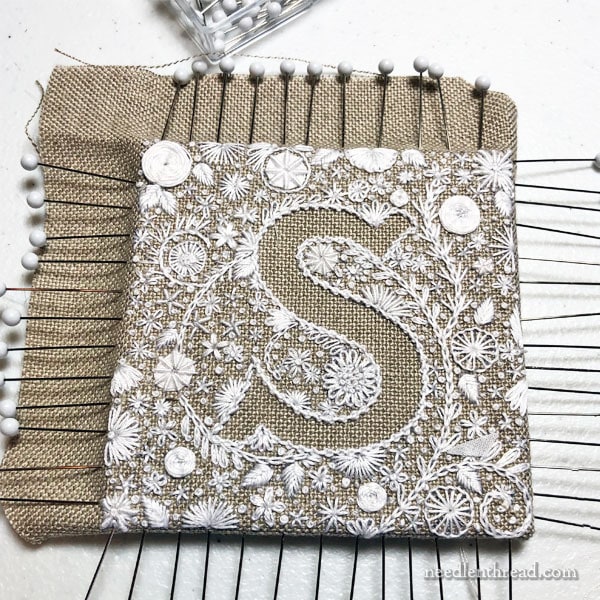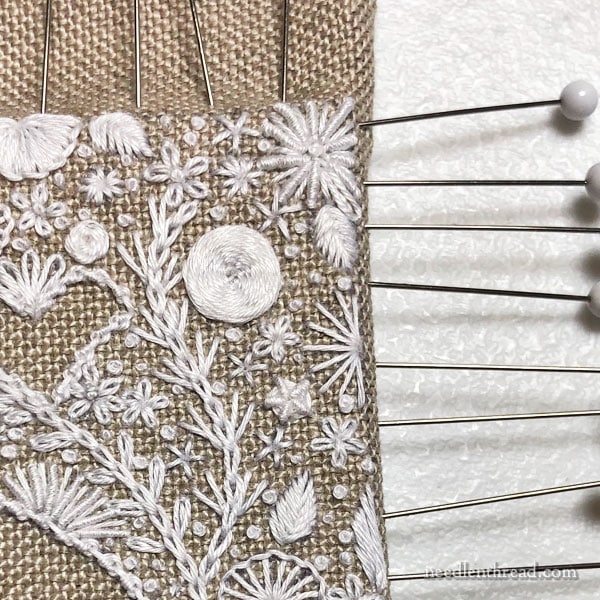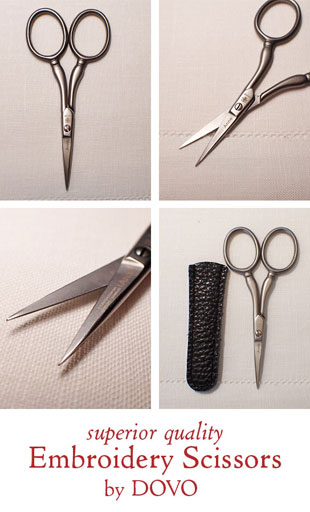Sometimes, you have to quit. It’s true! Sometimes, in the middle of a needlework project, you have to quit.
There can be myriad reasons why you have to quit a project. And the quitting may not be permanent. But it’s never a bad idea, when you feel inclined to quit, just to step away from it.
And that’s what happened with this whitework-on-natural embroidered monogram project.

This is where I had arrived, when I came to the quittin’ point.
The stitching was finished, the piece was damp stretched and blocked.
It was time for me to mount the embroidery on stiff card topped with some stiff pellon interfacing. I was hurrying to complete the first stage of finishing this 3.5″ square piece of embroidery into something usable.
I pinned the embroidery onto the stiff card all around. I was working quickly, and not really paying that much attention to things.

I turned the piece over and started folding and trimming, so that I could work up some decent mitered corners.
I don’t particularly like mitering corners on something this small, worked on linen that is about medium weight and backed with another layer of cotton. It makes it somewhat difficult to get a nice, tight corner on the miter.

I was in the middle of mitering that corner and not having any fun with it at all. I was grumpy and scurrilous and not really in the mood.
Plus, I knew there was a problem on the front of the piece, but I was thinking I could just fudge it and keep moving forward.
The photo above demonstrates the problem. The pinning was off. The sides didn’t align with the card backing. And I knew it.
But I really didn’t want to pin again!
And I really didn’t want to take out as much of the mitered corner as I had managed.
And on top of that, I had to leave. This was immediately before I was supposed to take off on my short little bit of traveling. I just wanted to get it done, so that I could start the next stage right when I got home.
I Quit!
But I’ll tell you what! I’m glad I finally just said, “Nope. I’m stopping Right Now.”
I quit.
When I get home, I will find this piece with one corner mitered, with one side askew on the card, with the whole thing to take apart, and probably a new card backing to prepare.
But you know what? I can’t wait! I can’t wait to get home and get that thing finished – and finished right.
The moral of the story: when you know things are not quite right with the process (whether it’s stitching or finishing), and especially if you’re trying to rush the job for some reason, it’s always better just to quit.
I don’t mean be a quitter. I mean to quit what you’re doing and to come back to it later, when the mood is right, when your patience is restored, when your outlook is brighter, and when the pressure’s gone.
I’ll be back at it in a few days, and I’m excited about it now. If I had mitered all four corners and laced the back of that embroidery onto the card, my outlook on the project would be pretty dismal right now. All that wasted effort when I knew the piece was crooked!
But my outlook is good, because I quit!
On that note, by the time you read this, I’ll be traversing the nation again, heading back to Kansas. Home sweet home! I’ll see you soon, from my own little studio, and I’ll share the final outcome for this little piece of embroidery.
Happy Monday!







You didn’t quit – you just put the piece into a time out. There’s a difference! And yes, I’m kidding…
Best advice ever, often, one needs to put a project down. When coming back to it, what is needed is either ripping out some work, or reworking. It is not a good idea to do that under stress – everything will be worse. Luckily most of us have more than one project, so put the offending project down. It’s really not quitting, its just taking a time out.
I love this piece!!! Can’t wait to see it completed. On very beautiful work– Imperfections are ok with me–it just shows that we aren’t a machine or a computer–and that’s a good thing!
Amen Sister!
I think this is great advice! I’m a long time sewer (over 50 years) and needlecrafter. When I’m working on a project and the first few steps aren’t going well I usually quit for the day. I’ve found that stubbornly sticking to it just makes things worse. Often when I return to my project the next day everything just falls into place!
I completely agree with you. Sometimes stopping while frustrated, or in a hurry is the best thing. It almost always saves time, effort and that sense of failure that comes from having to rip out more than if you had just stopped to begin with because you still can’t live with the problems. Learning to take my own advice rather than teaching others is the hardest part!
I am not sure if this appropriate for embroidery or if it is something that you are already doing. (My work lately tends to be finished as an unquilted quilt or pillow type piece (latter including stuffed ornaments) so the edges are stitched to a backing piece and in the old days – corners were just folded – and I have never found a need to straighten a piece – they always seem to come out with the fabric straight and not distorted.
I do machine sewing of utility pieces especially drawstring bags. As a reenactor I sew A LOT of drawstring bags in sizes from small (holding band aids + cream tube to medium – (holding cooking utensils or place settings) or large (holding all sorts of things). The bags are used to hide modern items and /or keep together items needed together. I also make the bags for period games which husband makes sells – each taking a small bag for dice and pieces and a larger one for board, instructions and smaller bag.
After the bags are stitched I cut the corners of the bottom of the bag on the diagonal – far enough away to not fray, but close enough to make the turning easier. This gets rid of the bulk in the corners. I also do this if I embroider ornaments, pieces I will finish with batting, or pillows which have square corners.
Hard to explain what I mean – using the letter L – the fabric at the bottom of the L would be cut on this angle \ .
Not sure if doing so would make dealing corners of needlework being finished by being pinned and stretched easier to work or would make a problem, but I thought I would mention it. I allows there to be less fabric on the actual corner.
Dear Mary,
Your foreboding and subsequent resolution to quit, is a good news story to start off our week. Trust you enjoyed your time away and safe travel back home.
Oh what a lovely piece! Great advice! It’s always good to stop and revisit at a later time with a better attitude and fresh eyes!
Boy, this is the truth! The frustration makes you make even more mistakes and then when you come back to the project with fresh eyes, in a few days, you find you are disappointed. At that point you end up tearing it apart and redoing it.
My mum always used to say that once you started making mistakes in your knitting or stitching, it was time to pack it away for the day. Good advice, I reckon.
Working when frustrated, tired, peeved at the world – it’s time for me to put the project away and have chocolate and a nap, scrub something that needs it, wait for the phase of the moon to change, anything but try to force a finish – there be disaster in that!
And I agree with Meryl A’s suggestion of trimming the corners. It doesn’t take a lot to make for much less bulk. But don’t trim so much that the fabric can pull out of the corners when done. Also – do the corners need to have the backing fabric? Maybe that could probably be trimmed more than the linen, perhaps as far back as to almost the stitching???
I do trim the corners when making miters, and I trim out the backing fabric completely on the corners, up to the edge of the board. These miters weren’t quite finished, but once I re-do this, they’ll sew up just right, I think.
Dear Mary
I’m glad you didn’t totally quit but just stepped back until you return from your travelling. I hope you are having a great time and enjoying your adventure. The monogram is lovely and an unusual design but beautifully stitched. I look forward t the completion of the project and for your return. Thanks for sharing your dilemma with us I have been in the same situation as you many times and thank you for the advice of just stepping back until next time. Thank you for sharing with us your dilemma with us and for the advice and photos especially as you were in a hurry.
Regards Anita Simmance
I completely agree with you .. nothing wrong at all with setting a project aside when things are just not going the way they should. Ugh.
Now, lets talk about the fun part of this post .. where did you get this gorgeous project???!!! I want to stitch one, or several for gifts. LOVE it!
Jane
Sometimes stopping is the only sensible thing to do. When you’re feeling your way with a project finish like this you need to be able to fully concentrate and if I’m tiring, getting hungry or short of time, experience has taught me that generally I’ll end up more frustrated if I persevere even though I really really really want to Complete The Thing Now! It’s the triumph of reality over false expectations, but accepting it and being patient with myself and The Thing is what I regularly need to remember … I say ‘bother reality’, stop and go make a cup of tea! 🙂
Back when I was learning beadwork, our instructor said there would be times the beads would work against us. She said on those days put them back into their containers, put away the needles, the fabric, etc. and wait until another day when the beads were ready to cooperate.